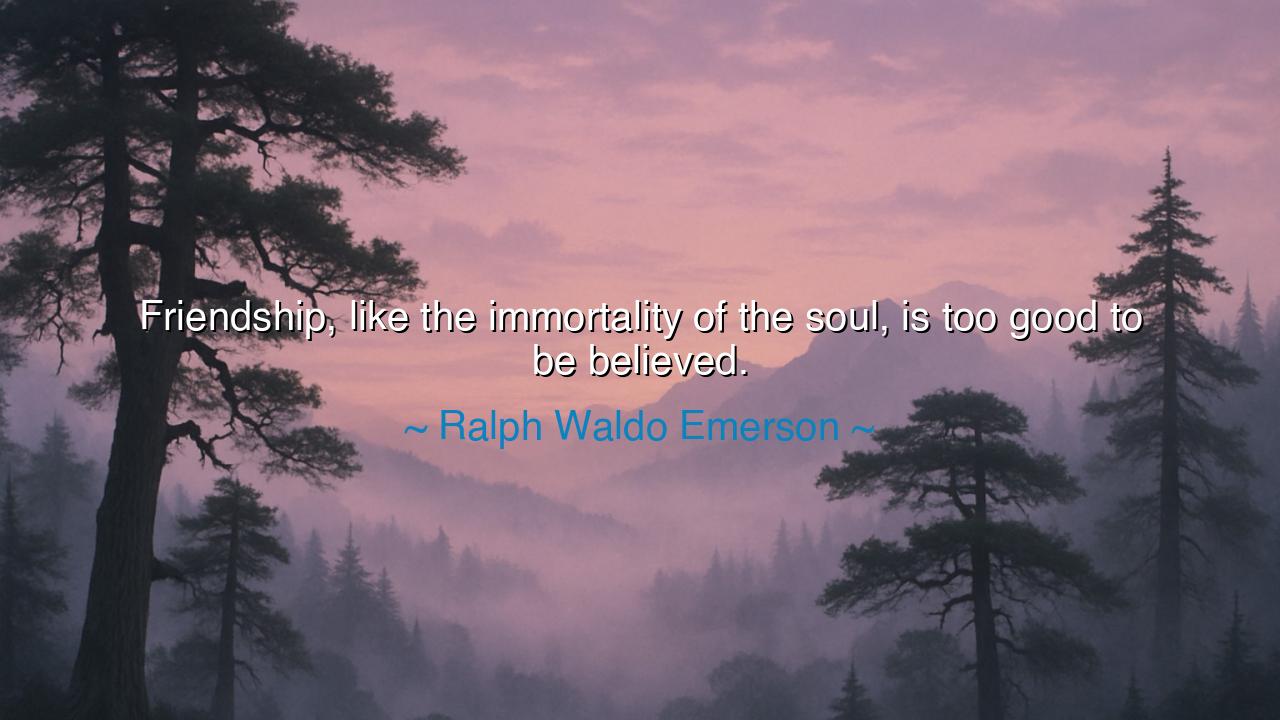
Friendship, like the immortality of the soul, is too good to be






In the luminous words of Ralph Waldo Emerson, the sage of Concord and prophet of the soul, there resounds a truth both tender and awe-inspiring: “Friendship, like the immortality of the soul, is too good to be believed.” Here, Emerson speaks not as a philosopher bound to logic, but as a mystic touched by wonder. He draws a sacred parallel between friendship and immortality, suggesting that both are so pure, so radiant in their promise, that the human heart can scarcely grasp their reality. For who among us has not, in some moment of loneliness or betrayal, doubted that such perfect love between souls could truly exist? And yet, when friendship reveals itself—true and selfless—it feels divine, like catching a glimpse of eternity through mortal eyes.
To understand the origin of Emerson’s reflection, we must step into the world of the Transcendentalists, that band of thinkers in 19th-century New England who sought to pierce the veil of ordinary life and touch the infinite. For Emerson, friendship was not mere companionship or mutual affection—it was a spiritual communion, a meeting of souls that awakens the divine within us. Just as he believed in the soul’s immortality—its unity with the eternal Spirit—so too did he believe that friendship partakes of that same divine mystery. True friendship, he wrote elsewhere, is “a masterpiece of nature,” for it lifts man from the dust of self and reminds him of his eternal kinship with the Infinite.
Yet Emerson’s tone here is bittersweet. “Too good to be believed,” he says—as though friendship, like the promise of heaven, belongs to a realm higher than this world can sustain. For in life, friendship often falters. The heart yearns for perfect understanding, for a soul that mirrors its own, but the frailty of human nature stands in the way. Misunderstanding creeps in, pride darkens affection, distance or time erodes the bond. And so Emerson, with his clear and wistful wisdom, recognizes that such perfection may seem like a dream—a vision so beautiful that the mind hesitates to trust it.
Consider the story of David and Jonathan in the ancient scriptures. Jonathan, son of a king, risked his father’s wrath to protect David, a humble shepherd destined for greatness. Their bond was sealed not by gain, but by loyalty, sacrifice, and truth. When they parted for the last time, “they wept together, but David wept the more.” Jonathan’s friendship did not save him from death, but it transcended death—it became immortal in the memory of man. This, Emerson would say, is friendship in its highest form: a union that defies time, self, and even mortality. And such love, so pure and enduring, does indeed seem “too good to be believed.”
There is something divine in every act of true friendship. When one soul looks upon another without judgment, when kindness is given freely and presence offered without demand, the moment shimmers with eternity. It is as though the soul recognizes in another its own reflection in the eternal light. Emerson saw this as proof of our immortal nature: if we can love so deeply, so selflessly, then something within us must be infinite. Friendship, therefore, is not merely human—it is evidence of the divine spark dwelling within mankind.
And yet, like the immortality of the soul, friendship requires faith. One cannot measure it, weigh it, or compel it. It must be believed in, nurtured through trust and patience. Just as faith in the soul’s immortality gives meaning to life beyond death, faith in friendship gives meaning to love beyond self. Emerson invites us to hold this faith even when the world seems cold, even when friends falter or depart. For every act of true friendship, however brief, affirms the goodness of existence itself.
Thus, dear listener, take this lesson to heart: friendship is not a gift to be taken lightly, nor a comfort to be consumed—it is a sacred calling. Treat it as you would the soul: with reverence, courage, and truth. Seek friends not for pleasure, but for growth. Offer loyalty even when it costs you. Speak honestly, forgive freely, and walk beside your friends in both sunlight and shadow. And when friendship seems too good to believe, believe it still—for in believing, you make it real.
For Emerson’s wisdom is a mirror of eternity: friendship and the soul are one and the same mystery—the meeting of what is mortal with what cannot die. To honor friendship, then, is to touch the edge of immortality itself. And those who live by that love, even for a moment, have already tasted the eternal.






AAdministratorAdministrator
Welcome, honored guests. Please leave a comment, we will respond soon